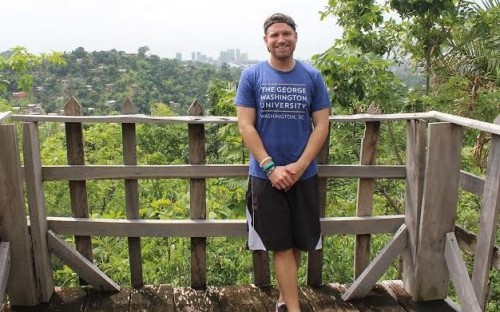Joshua was in Uganda on George Washington University School of Business' consulting abroad program.
After returning to the US, he started up Jonas Umbrellas, which sells limited edition umbrellas to help fund clean-water wells at schools in Uganda. Approximately 40% of profits go towards the building of wells.
At night, he works at Bar Taco restaurant in West Hartford, Connecticut, to pay for his business venture.
Along with three other co-founders, he plans to launch the Thank You Project, a social movement focusing on gratitude, in the coming months.
Prior to his MBA, Joshua worked as a market analyst for Fortune 500 insurance company Travelers. Before that, he spent six months in consulting.
Yet as a pioneering member of the millennial generation, Joshua is determined to make a positive social impact.
What makes Jonas Umbrellas unique?
You can get an umbrella at a local convenience store for two dollars but we provide so much more.
We’re selling batches of, for example, 500 unique umbrellas – numbered from one to 500 – which are directly linked to the building of a well. Once those 500 are sold they’ll never be sold again.
What people are looking for is that personal connection. When you buy our umbrella you know exactly which well you helped fund and that you are 1/500th of that project.
Why umbrellas?
That was more of a business decision than an inspired story!
I was in Boston for several months and it was raining every single day, so umbrellas were always in my face. I thought, these things are really ugly, they’re uninspired and no one’s ever done anything with them: what if we link a product that is blocking water to giving water?
What are the biggest challenges you have faced?
I thought getting clean water to Uganda was going to be the hardest part of my project, but honestly, the supply chain is a huge issue. You don’t realize how volatile it is as a consumer. I’ve had to change suppliers a couple of times.
What do you see as the future for Jonas Umbrellas?
We started off as an e-commerce brand selling directly to the consumer. Now, we’re transitioning to a more business-to-business model.
What advice do you have for MBAs looking to start their own business?
You need to put a good team around you. Going it alone might seem fast in the beginning, because you’re able to make snap decisions and there’s no one there to challenge you. But when things inevitably start to fail, when you’re weak, when you don’t know the answers, just having a sounding board of different opinions can really help.
Why are we are seeing increasing numbers of MBAs looking to make a social impact?
Millennials are like a revisionist history. We went through school during a financial crisis, which the generation before us didn’t.
This idea of greed and this money-hungry attitude blew up in everyone’s face. The only reaction to that is to go in the opposite direction.
We have this very idealistic view of how our lives could be. We’ve always been told you can do whatever you want to do. Now we’re actually trying it.
Why did you decide to pursue an MBA at GWSB?
I felt like I was just a cog in a big wheel that was going to turn forever. It made no difference what I did.
I’d always wanted to get a master’s degree and business always seemed to click for me, so an MBA seemed like a logical path.
GWSB stood out for me because of its openness and flexibility. With its small [MBA] class size, it takes a very hands-on approach. You have a voice there. That’s what makes the school so special.
RECAPTHA :
c7
33
90
53








